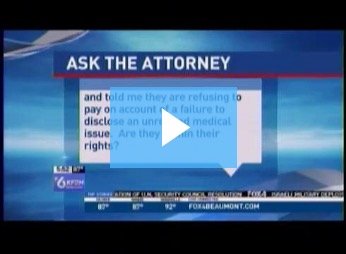The Importance of Medical Documentation in Personal Injury Cases

If you’ve been injured because of someone else’s negligence, such as a car crash or truck wreck or a slip and fall on dangerous premises in a supermarket or retail store, a personal injury claim can help you recover medical expenses, lost wages and additional compensation for your physical injuries and the associated pain, discomfort, and other impacts on your life and health.
When pursuing your claim, there’s a crucial detail you can’t afford to overlook: documenting your medical care. Strong, consistent medical records are often the backbone of a successful personal injury claim. At Gilbert Adams Law Offices in Beaumont, our Texas personal injury lawyers have seen firsthand how thorough medical documentation can make the difference between a denied claim or inadequate settlement offers and an adequate and fair monetary recovery as a result of your injuries.
Why Medical Documentation Matters
When you assert a personal injury claim, you bear the burden of proving that your injuries were caused by the accident, as well as the extent of your injuries and how your life has been affected. Insurance companies and defense attorneys will look for any reason to argue that your injuries are pre-existing, unrelated to the accident, or not as severe as you claim. Solid medical documentation directly counters these arguments by providing objective evidence that links your injuries to the incident and shows their true impact on your life.
Without clear, detailed medical records, even the strongest case can become a battle of opinions—one that the insurance company is very eager to win.
What Good Medical Records Should Show
Well-prepared medical documentation will tell the story of your injury, from the moment it occurred through your recovery. Important documents can include, for example:
-
Detailed diagnosis and treatment records: From ER visits to follow-up appointments, your medical files should describe the nature of your injuries, recommended treatments, surgeries, medications, and any complications.
-
Progress notes: These records show how your condition has improved—or worsened—over time. They help demonstrate whether your recovery has followed a typical path or if you’re facing long-term or permanent issues.
-
Specialist evaluations: If you’ve seen orthopedic surgeons, neurosurgeons, neurologists, pain management doctors, or physical therapists, their notes add valuable credibility.
-
Imaging and test results: X-rays, MRIs, CT scans, and lab work provide clear, objective evidence that can support your claim.
-
Prescriptions and medical equipment: Records of pain medications, mobility aids, or other assistive devices illustrate the level of care your injuries have required.
Records like these work together to connect the dots: the accident, the injuries, the treatment, and the impact on your daily life.
Timely and Consistent Treatment Is Critical
Insurance adjusters and defense attorneys will scrutinize your medical timeline. Gaps in treatment, delayed doctor visits, or skipped follow-ups can be used to argue that your injuries weren’t as serious as you claim or that they were caused by something unrelated to the accident.
That’s why it’s so important to seek medical attention immediately after an accident, even if you think your injuries are minor at first. Many serious injuries, such as soft tissue damage, head trauma, or internal injuries, may not be obvious right away. Seeing a doctor promptly not only protects your health but also creates a clear medical record tying your injuries to the accident.
Continuing to follow your doctor’s orders is just as important. If you stop attending appointments or ignore treatment recommendations, the insurance company may argue that you’re not really hurt or that you failed to do your part to recover.
How Poor Documentation Can Hurt Your Claim
Lack of proper medical records is one of the most common reasons otherwise valid personal injury claims get delayed or denied. Some of the problems we see include:
-
Incomplete or missing records: If you go to multiple providers but don’t keep copies or fail to mention all your injuries, key information can get lost.
-
Inconsistent statements: Contradictions between what you tell your doctor and what’s in the medical notes can cast doubt on your credibility.
-
Asymptomatic Pre-existing conditions: Without clear documentation, insurance companies may blame your injuries on prior conditions that, in reality, had not been symptomatic for years before the subject accident.
-
Self-treatment: Trying to handle injuries on your own instead of seeing a qualified doctor often weakens your claim.
Protecting your right to compensation means being proactive about keeping track of your medical care and making sure your doctors understand how the accident affected you.
What You Can Do to Strengthen Your Medical Documentation
While your doctors handle the treatment, you play an important role in making sure your medical documentation is complete and accurate. Here’s how you can help:
-
Be honest and thorough when describing your symptoms and limitations. Don’t downplay your pain or assume something will heal on its own.
-
Keep every appointment and follow your doctor’s recommendations for treatment, therapy, or referrals to specialists.
-
Keep a personal record of your pain levels, mobility issues, emotional struggles, and how your injuries affect your work, family life, and daily activities. A pain diary or journal can be powerful evidence.
-
Save receipts and invoices for medical bills, prescriptions, and travel expenses for treatment.
-
Communicate with your attorney about any new developments in your treatment or diagnosis.
At Gilbert Adams Law Offices, we work closely with our clients and medical professionals to gather, organize, and present medical documentation that makes a clear and compelling case for full and fair compensation.
Let Us Help You Build a Strong Case
Recovering from a serious accident can be stressful enough without worrying about whether you have enough paperwork to back up your claim. That’s why having an experienced Texas personal injury attorney on your side is so important. We know what insurance companies look for—and what they try to use against you. We make sure your medical records tell the full story of your injuries and the impact they’ve had on your life.
If you’ve been injured in an accident anywhere in Southeast Texas or beyond, don’t leave your recovery and your future to chance. Contact Gilbert Adams Law Offices today for a free consultation. We’re ready to stand up for you, protect your rights, and fight for the compensation you deserve.










